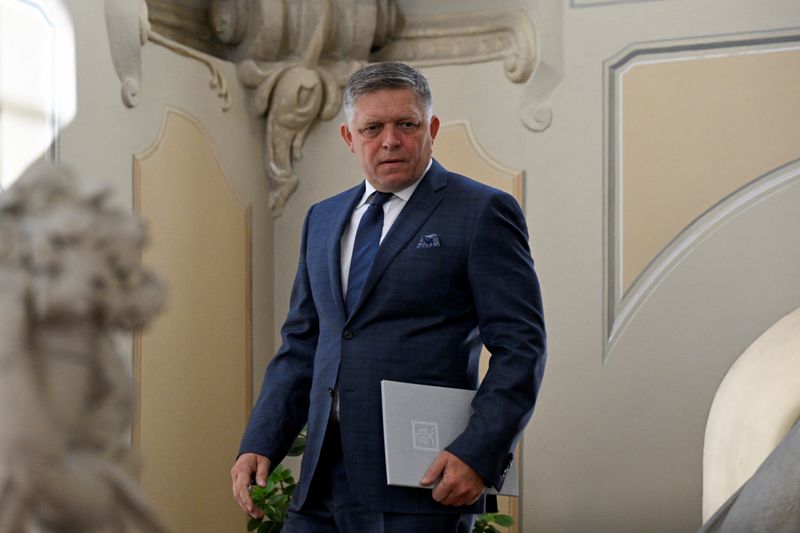By Krisztina Than and Jan Lopatka
BUDAPEST/PRAGUE (Reuters) - Robert Fico's election win in Slovakia after he had campaigned to end military aid to Ukraine shows creeping discontent in Central Europe over the war with Russia, but analysts do not expect a major policy turn-around by Bratislava or Warsaw.
Leaders in the region, which was once under Soviet rule, have been whipping up nationalist sentiment in Hungary, Slovakia and even traditionally anti-Russian Poland, with support for Ukraine falling victim to short-term political manoeuvring to win votes.
Fico's victory in Saturday's election prompted concerns that his new government would see NATO-member Slovakia joining Hungary in challenging the European Union's consensus on support for Ukraine.
Ahead of the vote, Fico pledged to end military supplies to Ukraine and strive for peace talks. This is a line close to that of Hungarian leader Viktor Orban but rejected by Ukraine and its allies, who say this would only encourage Russia.
However, analysts do not see a big policy switch regarding Ukraine in Slovakia and Poland.
Roger Hilton, a defence fellow at GLOBSEC, said the current rifts are about short-term political gains, while the long-term security interest of the region remains anchored in NATO, with the conflict in Ukraine seen as an existential threat.
"I don't believe the ascent of a single government in CEE, like that of Fico, will be the catalyst that leads to the collapse of support for Ukraine across the region," he said.
In Poland, where backing for Ukraine has been the strongest, the ruling government is under pressure from the far right to take a tougher stance on Ukraine before elections on Oct. 15.
A dispute with Ukraine over grains shipments and the extension of an import ban on Ukrainian grains by Poland, Hungary and Slovakia last month added to friction.
MODERATING EFFECT
In Slovakia, Fico's SMER-SSD party won the election with 23% of the vote. The liberal Progressive Slovakia followed with 18% and the HLAS (Voice) party - led by Fico's former colleague Peter Pellegrini - came in third with 14.7%.
The most likely coalition appeared to be of SMER-SSD with HLAS, a more centre-left and pro-European party that split away from SMER-SSD in 2020, and the pro-Russian nationalistic but small SNS.
This is a more middle-of-the-road group than a pre-election scenario of SMER plus SNS and Republika, a far-right party that failed to win any seats.
Samuel Abraham, head of the BISLA liberal arts college in Bratislava, said the presence of HLAS would be a significant moderating factor when it comes to Fico's policies on Ukraine.
Pellegrini has backed continuation of commercial arms supplies including to Ukraine, saying it was good for jobs, and he reiterated that stance on Sunday.
"He (Fico) is cynical and pragmatic enough and knows that if he pressed too much against the EU, if he wanted to cancel sanctions on Russia, he would hit the wall there in the form of Pellegrini," Abraham said.
"He will try to secure a pro-European line, he will push pro-Ukrainian line. It is the only way to legitimise himself, in the eyes of his voters who did not want to go with Fico."
Fico, 59, three-time prime minister, is a seasoned politician well-versed in Brussels politics. He is likely to tread carefully when it comes to support for Ukraine or other issues within the EU as Slovakia strongly benefits from the bloc's development funds.
His obvious ally is Orban, who was one of the first to congratulate him on his win. Orban's government has refused to send weapons to Ukraine and opposed EU sanctions against Russia, even though it never blocked them in the end.
Orban has used support for Ukraine in Brussels as leverage in talks about other issues.
MOMENT OF TRUTH
A key moment to test Central Europe's support for Ukraine could come in December, when the EU may decide to start membership talks with Ukraine. This would require the unanimous backing of all 27 EU countries.
"We are convinced it is illusory to deal with this question at a time when a sharp military conflict goes on in Ukraine," Fico told Reuters last week when asked if he supported Ukraine's EU membership and the opening of entry talks this year.
But Fico did not specifically say he would oppose the start of talks.
Orban said on Friday that "very difficult questions" would need to be answered before the EU could even start membership talks with Ukraine. He did not say Budapest would block the process either.
Poland's ruling nationalist government, which leads polls ahead of the election, has expressed its support for Ukraine's membership, although relations with Kyiv cooled lately.
However, once the Polish election is over and policymakers sit down for talks in Brussels, unity is likely to form behind Ukraine, said Mujtaba Rahman, managing director for Europe at think tank Eurasia group.

"Ultimately what will happen is that Slovakia and Hungary will get on board with the European consensus because many issues are linked in Europe," Rahman said.
"The bigger challenges are not Slovakia, or Hungary but the U.S. election cycle and the impact that has on support for Ukraine."